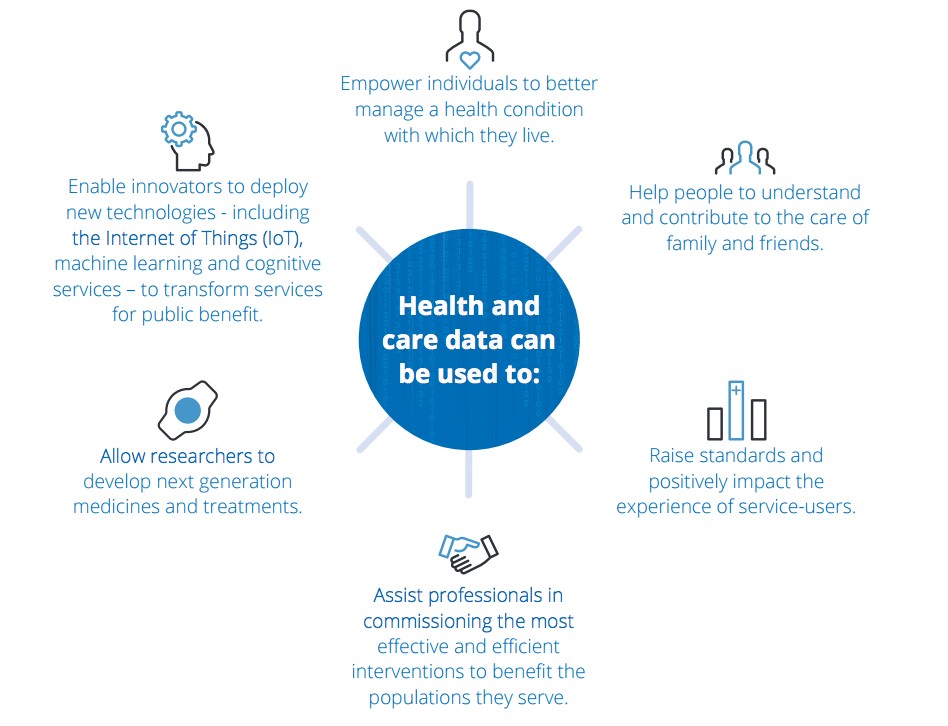This week we’re delighted to host a guest blog from Annemarie Naylor, Director of Policy and Consultancy at start up health and social care charity Future Care Capital.
As Director of Policy for Future Care Capital, I’m delighted we published our first policy report about health and care data this week, following a busy six months spent researching and talking to people about such an important issue.
Over the years, I’ve represented the third sector at a national level and contributed to the local government transparency code to encourage the publication of datasets of interest to communities. I’ve designed web platforms bolstered by discussions with experts at Microsoft and Google and the White House CTO courtesy of a UKTI trade mission for SMEs. I’ve also worked with the private sector to develop practical data-driven tools for third sector organisations operating at the local level.
In this new role, I want our team to offer practical solutions to overcome some of the key challenges we will face over the coming decade, and I believe there is enormous potential for health and care data to transform outcomes.
It was timely, then, that we published our report as the Government moved to respond to the National Data Guardian for Health and Care’s Review of Data Security, Consent and Opt-Outs and the Care Quality Commission’s Review ‘Safe Data, Safe Care’ – which echoed a number of the recommendations we make, including:
- streamlining NHS Digital’s Information Governance Toolkit to improve data sharing between health and care organisations;
- strengthening the Care Quality Commission’s role in championing the digital agenda and, in particular, data security standards; and
- applying meaningful sanctions to deter criminal and reckless behaviour.
There was, understandably, an emphasis upon cybersecurity to improve the resilience of critical systems in light of the recent WannaCry attack. But, from our perspective, most heartening was the Government’s commitment to reinforce the importance of sharing information for wider purposes such as medical science and protecting vulnerable people – because, as we say in the report, the fertile ‘middle ground’ between individual ‘data subjects’ and value creators can only be activated through education and promotion linked to new safeguards and incentives to engender a collective sense of responsibility for our well-being as a society.
It will, of course, take time to build public trust and the Government provided numerous assurances with that in mind. In our report, we also recommend it takes steps to build upon leading-edge initiatives like the UK Biobank and 100,000 Genomes project to nurture a culture of ‘data philanthropy’ in the UK; in particular, we believe it should explore the scope for a National Health and Care Data Donor Bank and support the development of other ‘trusted vehicles’ to afford people a choice in how their data is ‘invested’ for wider public benefit over the years ahead. We also recommend it introduces further reassurance in the form of a dedicated health and care Data Privacy Shield in future, because there are, nowadays, to coin a phrase, ‘bytes of me all over the place’.
Our report also looks at how the UK can cement a ‘health and care data advantage’ to proactively stimulate innovation and support related enterprise over the coming decade. It is imperative Government invests in pertinent skills development, creates the space for data-driven health and care enterprises and commits to appropriate infrastructure. But, we are clear that it must sponsor the emergence of a ‘high trust’ data sharing environment underpinned by world-class data ethics to fully realise the fruits of such economic development measures.
There is a real opportunity for the UK to become a global leader in harnessing ‘data for good’ – making the most of new and emergent technologies to transform treatments and services. We call upon the Government to blaze a trail in the development of data ethics and rights that are fit for the 21st century to build trust and safeguard everyone’s privacy, whilst encouraging data-driven innovation and enterprise to flourish. None of this can be achieved without the support and involvement of the public.
Future Care Capital is a charity committed to engaging everyone in the design of health and care provision. It is by being strategic and planning for the future together that we can deploy data to deliver better health and care outcomes for everyone in our society.
Read Future Care Capital’s new report, Unleashing the Potential of Health and Care Data

